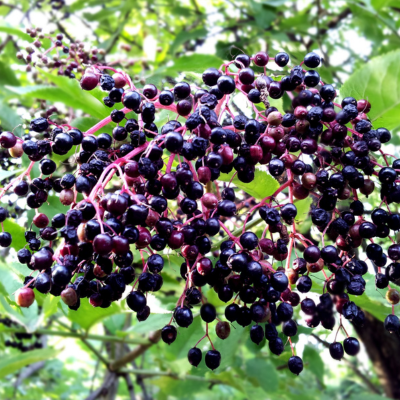Elder
Sambucus nigra Family: Caprifoliaceae

Overview
Elder, especially in the form of elderberries and elderflowers, is a cornerstone of immune support in traditional herbal medicine. Revered for its antiviral and anti-inflammatory actions, Elder is especially effective for colds, flus, fevers, and upper respiratory infections. Its dark berries are rich in antioxidants, while the delicate flowers act as a gentle diaphoretic to support sweating and fever reduction. Traditionally, Elder is considered a guardian plant, offering both physical protection and spiritual safeguarding when planted near the home or garden.
Traditional Uses:
Caution:
Do not eat berries raw, can cause digestive upset and diarrhea
Applications:
½-1 Cup infusion daily to boost immune system; more frequently at onset of symptoms; syrup: 1-2 tbsp several times throughout the day
Parts Used:
Flowers, berries
Fun Fact:
In old world traditions, an elder bush was commonly planted at the edge of the herb garden as the ‘protector’ of the garden
Habitat & Growing Conditions:
Native to North America and Europe in zones 4-7. Likes moist edge habitat near lakes and ponds, in full or light shade
Traditional Chinese Medicine Flavors:
Acrid, bitter, cool
Properties:
- Diaphoretic
- Alterative
- Laxative (aged bark)
- Stimulant
- Anti-rheumatic (berries)
Key Constituents:
- Vitamins A and C
- Bioflavonoids
- Flavonoids
- Phenolic compounds
- Beta-carotene
- Iron
- Potassium
- Phytosterols
Try our immune supporting products featuring Elderberry:
Source:
Medicinal Herbs, Rosemary Gladstar p134
The Way of Herbs, Michael Tierra p133
These statements have not been evaluated by the Food and Drug Administration. This product is not intended to diagnose, treat, cure, or prevent any diseases. If you are under the care of a health care provider and/or taking prescription medication, check with your health care provider before taking any herbal supplement.
